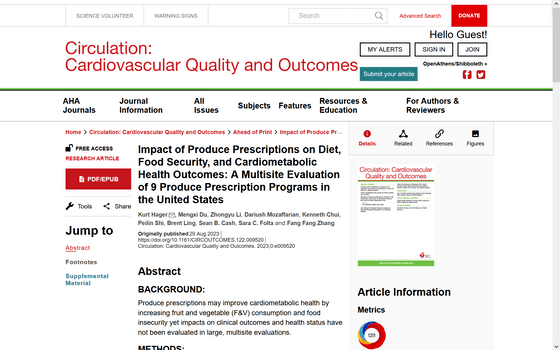Report that diabetic and obese patients improved by giving them ``free vegetables and fruits''

There are many people who don't usually eat vegetables and fruits for reasons such as the hassle of managing and preparing them, or because they don't like the taste. Similarly, when we provided free food to people with diabetes, high blood pressure, and obesity who did not normally eat vegetables and fruits, we found that their health improved.
Impact of Produce Prescriptions on Diet, Food Security, and Cardiometabolic Health Outcomes: A Multisite Evaluation of 9 Produce Prescription Programs in the United States | Circulation: Cardiovascular Quality and Outcomes

Prescriptions for fruits and vegetables can improve the health of people with diabetes and other ailments, new study finds
Many medical institutions in the United States have implemented ' Food is Medicine ' programs that provide free healthy meals to patients. Kurt Hager of Tufts University's Friedman School of Nutrition Science and Policy and his colleagues tracked similar programs at multiple institutions and studied the health outcomes of those who received them.
In the areas tracked by Hager and his colleagues, participants in the program receive about $65 worth of electronic cards and coupons each month that they can use to buy their favorite produce at grocery stores and farmers markets. was selected. Program participants ate more vegetables and fruits than non-participants, and were less likely to worry about not having enough food due to issues such as poverty.

When Hager et al. investigated the health status of 3,881 program participants collected from medical institutions in low-income areas, they found that all participants' daily intake of vegetables and fruits increased compared to before, and diabetes was lower. People with glycated hemoglobin of 6.5% or more, which is considered to be at high risk, had a 0.29% decrease in glycated hemoglobin. Furthermore, it was found that the systolic blood pressure of people with high blood pressure decreased by 8.38 mmHg, and the diastolic blood pressure decreased by 4.94 mmHg, which was about half the reduction achieved by blood pressure lowering drugs.
'More than 300,000 Americans die each year from cardiovascular disease and diabetes,' Hager et al. 'Low-income Americans are more likely to eat foods that are moderately unhealthy, and this study shows that a diet of vegetables and fruits is associated with significant improvements in health outcomes.'

Related Posts:
in Junk Food, Posted by log1p_kr







